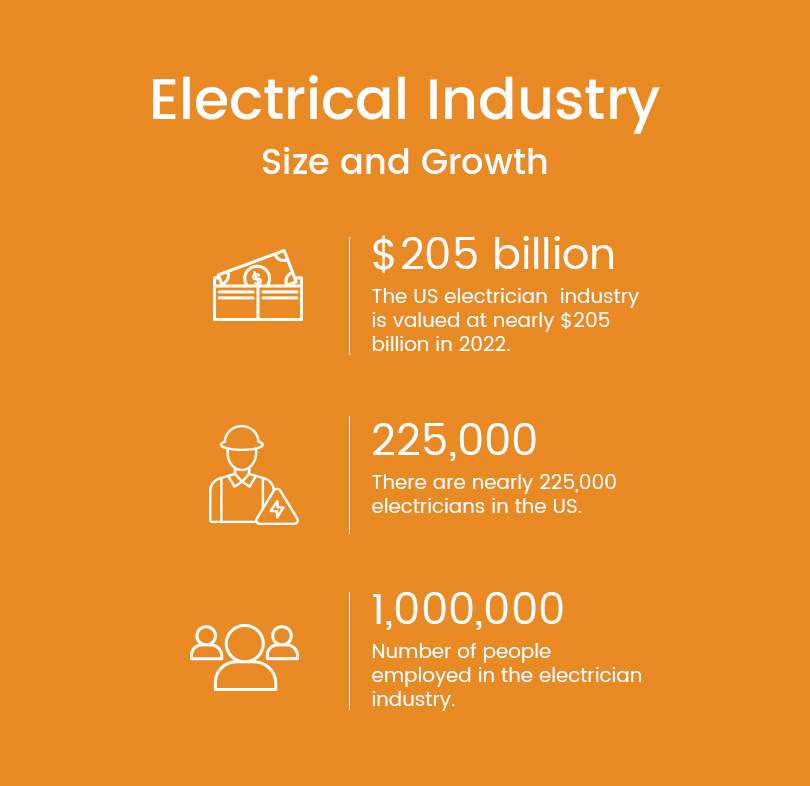Electricity powers our world, and the skilled professionals responsible for installing, repairing, and maintaining electrical systems are known as electrical contractors. Becoming a licensed electrical contractor is a rigorous process, but what happens when these professionals need to work in different states? That’s where electrical license reciprocity comes into play.
Expand your electrical business across state lines with Field Promax.Sign up now.
In this blog, we’ll explore the concept of electrical license reciprocity in the United States. We’ll delve into the specifics of Florida’s electrical contractor license requirements and list out Florida’s reciprocity agreements with various states. We’ll also highlight the consequences of performing electrical work without a valid license. So, whether you’re an experienced electrical contractor or considering this career path, read on to understand how electrical license reciprocity affects you.
Understanding Electrical Contractor Licenses
Electrical contractors are responsible for ensuring that electrical systems in residential, commercial, and industrial settings operate safely and efficiently. To become a licensed electrical contractor in the United States, individuals must typically meet specific educational, training, and examination requirements. These requirements are established at the state level, and they may vary significantly from one state to another.
In this blog, we will focus on the state of Florida as an example to highlight the general requirements for an electrical contractor license. Please note that the requirements and regulations in Florida may differ from those in your state.
Scope of Electrical Contractor Business in Florida
The US electrical contractor industry is valued at $205 billion in 2022 and is expected to reach $284 billion by 2028 at a CAGR of 3.94%.

Among all the states, Florida is a great place to start or expand an electrical contractor business. The average hourly pay for an electrical contractor in Florida is $28.80. The average annual income for electrical contractor business owners in the U.S. is approximately $96,580.
However, to work in Florida, you must have an electrical contractor license. And to pursue licensure, you need to fulfill certain requirements.
Florida Electrical Contractor License Requirements
The process of obtaining an electrical contractor license in Florida is stringent and requires candidates to meet specific criteria. The following are the typical Florida electrical contractor license requirements:
-
- Experience
Florida usually requires candidates to have a certain number of years of experience working as an electrician under the supervision of a licensed electrical contractor. The specific number of years may vary depending on the type of license sought.
-
- Examination
Candidates must pass the required electrical contractor’s examination, which assesses their knowledge of the National Electrical Code (NEC) and the Florida Building Code.
-
- Insurance and Bonding
Electrical contractors in Florida are often required to carry liability insurance and be bonded. This is a crucial step to protect both the contractor and the clients.
-
- Licensure Fees
There are various fees associated with the application process, including an initial application fee, an examination fee, and a license fee upon approval.
-
- Documentation
Applicants are required to submit documentation proving their work experience, as well as their examination results and proof of insurance.
-
- Background Check
Florida typically conducts a background check on all applicants to ensure they have a clean criminal record.
-
- Continuing Education
Licensed electrical contractors in Florida must complete continuing education requirements to stay updated on the latest industry developments and code changes.
Now, let’s find out the different types of electrical contractor license Florida offers.
If you have fulfilled the stipulated requirements, you can have one of the four types of electrical contractor licenses in Florida. This includes:
- Registered Electrical Contractor License: This license allows contractors to work within a specific municipality or county in Florida.
- Certified Electrical Contractor License: This license enables contractors to work throughout the state of Florida.
- Florida Unlimited Electrical Contractor License: This is the highest level of electrical contractor license in Florida, allowing contractors to perform electrical work in all areas of the state.
Now, let’s explore the concept of electrical license reciprocity and how it affects electrical contractors working across state lines.
Electrical License Reciprocity: What Is It?
Electrical license reciprocity is an agreement that allows licensed electrical contractors in one state to have their license recognized and accepted in another state without having to go through the entire licensing process again. This system promotes mobility for electrical contractors, simplifying the process of working in different states. However, it’s important to understand that reciprocity agreements can vary significantly from one state to another.
The Importance of Electrical License Reciprocity
-
- Mobility for Electricians
Electrical license reciprocity allows electricians to work across state lines without the need to undergo the complete licensing process in a new state. This promotes professional mobility, giving licensed electricians the flexibility to take on projects in different geographic regions.
-
- Workforce Flexibility
Reciprocity makes it easier for electrical contractors and skilled electricians to respond to demand fluctuations and job opportunities in different areas. This, in turn, contributes to workforce flexibility and can help address regional shortages of skilled electricians.
-
- Economic Growth
Reciprocity supports economic growth by encouraging the movement of qualified electricians to areas where their skills are needed most. This can help facilitate construction and infrastructure development projects, which, in turn, stimulate local economies.
Optimize your resources and boost revenue with Field Promax. Sign up today.
-
- Consumer Protection
While promoting mobility, electrical license reciprocity also ensures that the receiving state recognizes the qualifications and competency of the licensed electrician. This safeguards consumers, as they can have confidence that the electrician they hire meets certain professional standards.
-
- Streamlined Licensing Process
Reciprocity reduces the administrative burden on electricians. It eliminates the need for duplicating the licensing process, taking exams, and paying additional fees when they move to another state.
-
- Professional Development
Reciprocity encourages electricians to invest in their professional development and maintain their licenses. The knowledge and skills required to obtain and keep a license align with best practices in the electrical industry.
-
- Consistency in Quality and Safety
States that participate in reciprocity often have similar or equivalent licensing requirements, which ensures a consistent level of quality and safety in electrical work. This consistency benefits consumers and the industry.
-
- Fostering Innovation
Electricians who move between states can bring their knowledge and innovative practices from one area to another, potentially improving processes and techniques in the electrical field.
-
- Reduction in Unlicensed Work
Reciprocity helps reduce the occurrence of unlicensed or underground electrical work, as it provides a legitimate pathway for licensed professionals to work in new jurisdictions.
-
- National Standards Adoption
States participating in reciprocity are more likely to adopt or align with national electrical code standards. This promotes consistency and reduces confusion among electricians and consumers.

Until very recently, Florida did not have any license reciprocity agreements with other states. As of June 1, 2021, licensed electrical contractors from certain states can now enter into a reciprocity agreement with the Florida Construction Licensing Board and apply for reciprocity. This allows them to work and run businesses in the state of Florida with their existing electrical contractor license.
The states that have reciprocity agreements with Florida include:
- Alabama
- Connecticut
- Arkansas
- Illinois
- Georgia
- Kentucky
- Nebraska
- Mississippi
- Rhode Island
- West Virginia
On the other hand, if you have a Florida electrical contractor license, you can work via reciprocity agreement in the following states:
- Arkansas
- Alabama
- Connecticut
- Colorado
- Indiana
- Illinois
- Mississippi
- Maine
- Nebraska
- West Virginia
To avail of reciprocity in Florida, an electrical contractor must fulfill the following requirements:
- CILB form 32
- Licensing certification from the issuing state
- 10 years of experience as a journeyman or master electrician in the issuing state
Please note that reciprocity agreements can change, and states may modify their requirements over time. Therefore, it’s essential to verify the current reciprocity agreements and conditions with the respective state’s electrical licensing board or authority.
Penalty for Performing Electrical Work Without a License
- Fines
Individuals caught performing electrical work without a license may face substantial fines, which can vary depending on the severity of the violation and local regulations. - Legal Liability
Unlicensed contractors may be held legally liable for any damages or injuries resulting from their work, potentially leading to costly lawsuits. - Cease and Desist Orders
Authorities can issue cease and desist orders to stop unlicensed contractors from working. Violating such orders can result in further legal action. - Loss of Reputation
Working without a license can damage a contractor’s reputation, making it challenging to secure clients and jobs in the future. - Criminal Charges
In some cases, unlicensed electrical work can lead to criminal charges, especially if it results in severe accidents, injuries, or property damage.
It’s crucial for both clients and contractors to ensure that any electrical work is performed by a licensed and qualified professional. Clients should verify a contractor’s license before hiring them, and contractors must adhere to state and local regulations to maintain their licenses.
Performing electrical work without a valid license is not only illegal but also poses significant risks to both contractors and clients. It’s essential to follow state and local regulations, maintain licensure, and ensure that electrical work is carried out by qualified professionals to guarantee safety and quality in the electrical industry.
To this end, Field Promax can be your biggest advantage.
Essentially an electrical contractor business software system, Field Promax is a powerful tool that simplifies the complex process of delivering quality service for electricians. With its user-friendly interface and robust features, Field Promax streamlines the workflow and thus adds efficiency, transparency, and scalability to the business process, making it more productive and profitable.
In addition to enhancing business performance, Field Promax can also help you with the critical aspects of the application and verification processes required to avail of electrical license reciprocity. It allows electrical contractors to organize valuable information, like employee licensing information, qualifications, and work experience, ensuring that they meet the requirements for reciprocity in their chosen state.
Field Promax’s intelligent system cross-references this data with the specific reciprocity agreements and conditions, making sure that everything aligns perfectly. It not only saves electricians time and effort but also minimizes the chances of errors or omissions that can delay the reciprocity process.
In a field where precision and compliance are paramount, Field Promax is an invaluable tool that makes electrical license reciprocity a smoother, more efficient process for licensed professionals seeking to work across state lines.
For more information contact Field Promax today.


